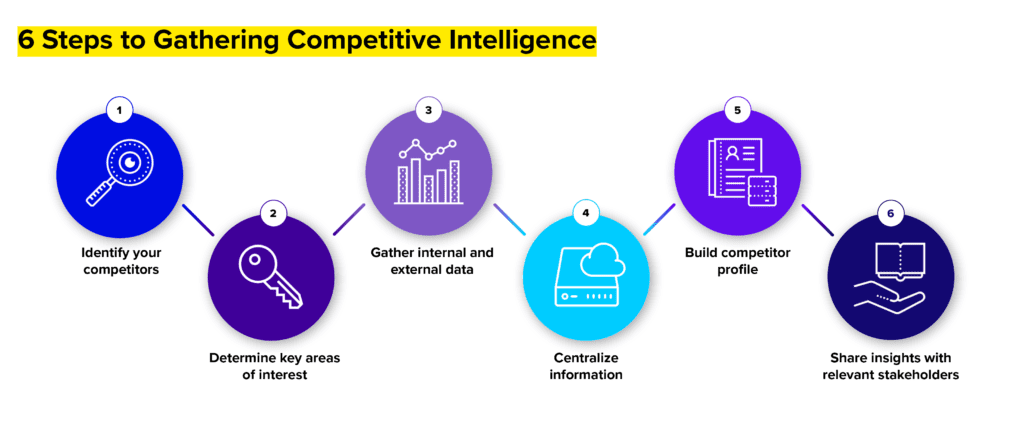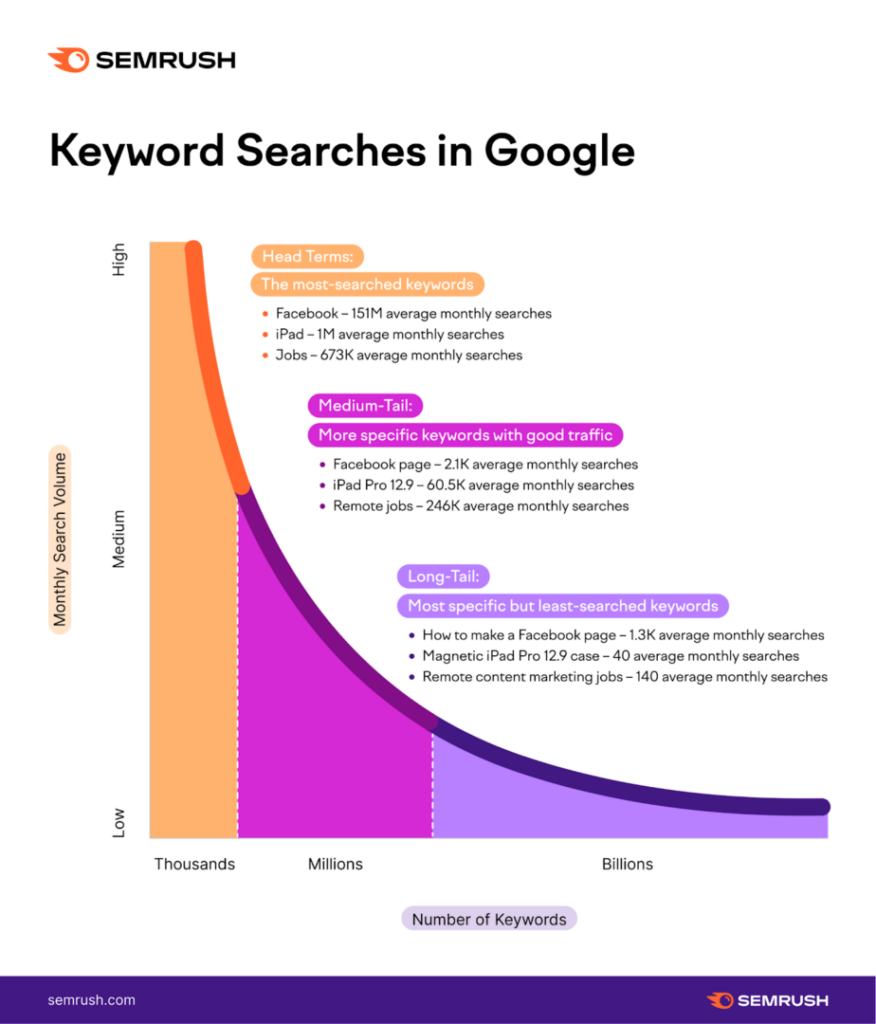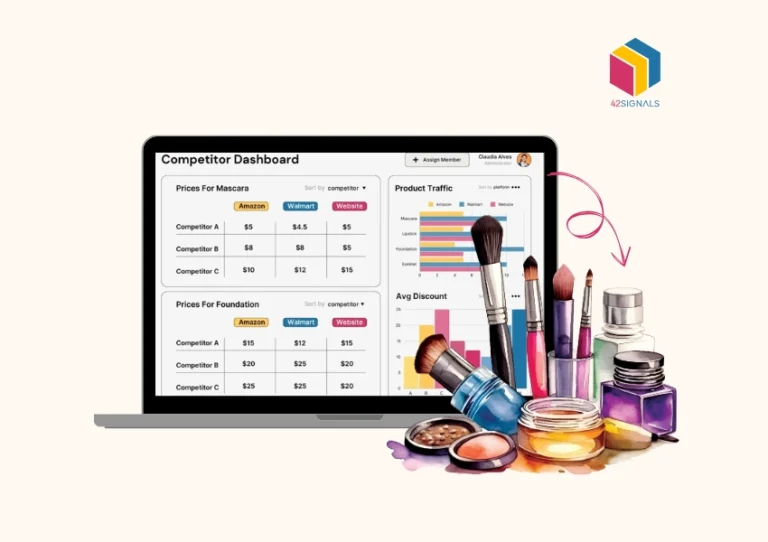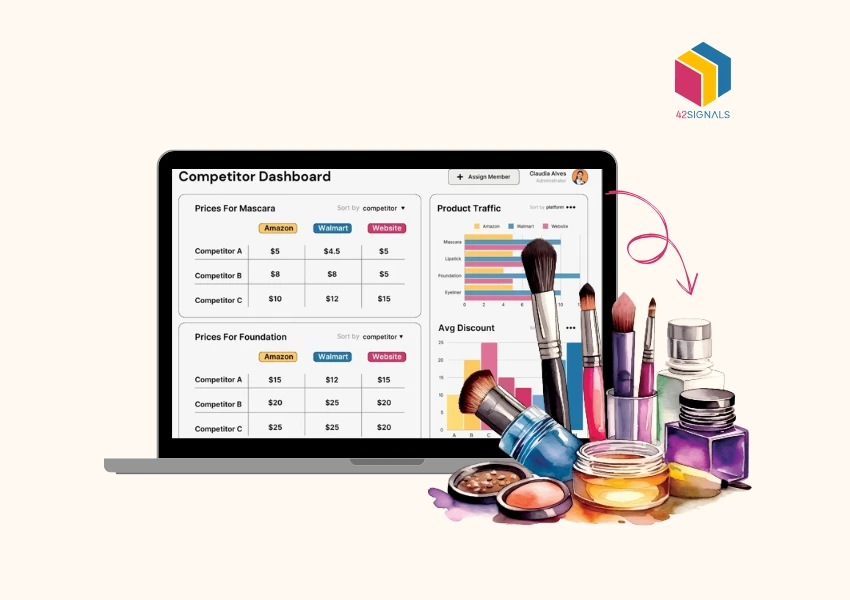One of the most effective ways to maintain a competitive edge is by leveraging search intelligence to gain insights into what your competitors are up to. Search marketing intelligence provides a treasure trove of data that can help businesses understand competitor strategies, identify market trends, and optimize their campaigns.
In this article, we’ll look into how search intelligence can be harnessed to gain a deeper understanding of your competitors’ activities, using key concepts such as competitor intelligence, competitive intelligence, keyword research, competitor monitoring, and price monitoring.
What is Search Intelligence?
Search intelligence refers to the use of data and analytics to gain insights from search engine activity. It involves analyzing search queries, keywords, and user behavior to uncover patterns and trends that can inform marketing strategies.
With the right tools and techniques, it can provide a comprehensive view of a competitor’s online activities, allowing businesses to adapt and respond to changes in the market effectively.
Search data goes beyond basic keyword research by offering a holistic view of the digital landscape. It allows businesses to understand not only the keywords their competitors are targeting but also how they are structuring their content, which channels they are prioritizing, and how their strategies are evolving.
How Competitive Intelligence Shapes Your Strategy?

Image Source: Semji
Competitor intelligence is a subset of competitive intelligence focused specifically on understanding competitors’ actions, strategies, and performance. It involves gathering and analyzing data about competitors to make informed business decisions. Competitor intelligence can provide valuable insights into how competitors are positioning themselves in the market, what messaging they are using, and which products or services they are prioritizing.
By leveraging search marketing intelligence for competitor intelligence, businesses can gain a detailed understanding of their rivals’ online strategies.
This includes –
- Tracking changes in keyword rankings
- Analyzing their content marketing efforts, and
- Monitoring their social media activities.
With this information, companies can identify gaps in their strategies and capitalize on new opportunities.
Competitive Intelligence
Competitive intelligence encompasses a broader scope than competitor intelligence, focusing on gathering and analyzing data about the entire competitive landscape. This includes understanding industry trends, customer preferences, and emerging technologies. In the digital age, competitive intelligence is vital for businesses to adapt to rapidly changing market conditions and customer demands.

Image Source: Klue
Search marketing intelligence plays a crucial role in competitive intelligence by providing insights into consumer behavior and market trends. By analyzing search queries and keyword trends, businesses can identify shifts in consumer interests and preferences. This information can guide product development, content creation, and marketing strategies to align with evolving customer needs.
Search Intelligence for Keyword Research
Keyword research is a fundamental aspect of search intelligence that involves identifying and analyzing the search terms and phrases that users enter into search engines. It provides valuable insights into consumer intent and behavior, allowing businesses to optimize their content and advertising campaigns.

Image Source: SEMrush
Effective keyword research involves more than just identifying high-volume keywords. It requires understanding the context and intent behind each search query. By analyzing the keywords competitors are targeting, businesses can gain insights into their competitors’ content strategies and identify opportunities to differentiate themselves.
Tools like Google Keyword Planner, SEMrush, and Ahrefs provide comprehensive data on keyword search volume, competition level, and related keywords. By leveraging these tools, businesses can identify high-potential keywords that align with their target audience’s interests and needs.
Competitor Monitoring
Competitor monitoring is a proactive approach to tracking competitors’ activities and strategies. It involves continuously monitoring their online presence, including websites, social media, and advertising campaigns. This ongoing analysis provides valuable insights into how competitors are positioning themselves and adapting to market changes.
Search intelligence tools enable businesses to monitor competitors’ keyword rankings, backlink profiles, and social media mentions. By understanding which keywords competitors are ranking for and how their content is performing, businesses can identify areas where they can improve their strategies.

Image Source: Competitor Price Monitoring | 42Signals
Competitor monitoring also involves analyzing competitors’ pricing strategies and promotions. Price monitoring tools can help businesses understand how competitors are pricing their products and identify opportunities to adjust their pricing strategies to remain competitive.
Price Monitoring
Price monitoring is a critical aspect of competitive intelligence that involves tracking competitors’ pricing strategies and adjustments. In today’s dynamic market, pricing plays a significant role in consumer decision-making. By understanding how competitors are pricing their products, businesses can make informed decisions about their own pricing strategies.
42Signals is a powerful tool that provides real-time data on competitors’ pricing changes and promotions. This information allows businesses to respond quickly to price adjustments and promotions, ensuring that they remain competitive in the market. By leveraging search intelligence for price monitoring, businesses can identify trends in pricing strategies and make data-driven decisions to optimize their pricing strategies.
How to Effectively Use Search Intelligence Tools?
Several tools and platforms are available to help businesses harness the power of search data for competitors and competitive intelligence. These tools provide valuable insights into competitors’ online activities, keyword strategies, and pricing strategies.
Here are some popular tools that businesses can use:
1. SEMrush
SEMrush is a comprehensive digital marketing tool that offers a wide range of features. It provides insights into competitors’ keyword rankings, backlink profiles, and advertising strategies. SEMrush also offers competitive analysis reports that help businesses understand how they compare to their competitors.
2. Ahrefs
Ahrefs is another powerful tool for search intelligence that focuses on backlink analysis and keyword research. It provides detailed insights into competitors’ backlink profiles, helping businesses identify potential opportunities for link building. Ahrefs also offers keyword research tools that help businesses identify high-potential keywords and track their rankings over time.
3. SpyFu
SpyFu is a tool that focuses on competitor analysis and keyword research. It provides insights into competitors’ advertising strategies, including the keywords they are targeting and the ad copy they are using. SpyFu also offers historical data on keyword rankings and advertising spending, helping businesses understand competitors’ long-term strategies.
4. Google Keyword Planner
Google Keyword Planner is a free tool that provides insights into keyword search volume, competition level, and related keywords. It is a valuable tool for keyword research and identifying high-potential keywords that align with business objectives. By leveraging Google Keyword Planner, businesses can optimize their content and advertising campaigns to reach their target audience effectively.
5. 42Signals for Search Intelligence

42Signals is a robust price monitoring tool that provides real-time data on competitors’ pricing changes and promotions with its digital shelf analytics feature. It offers insights into pricing strategies and helps businesses make data-driven decisions about their own pricing strategies. 42Signals also provides historical data on price changes, allowing businesses to identify trends in competitors’ pricing strategies.
Implementing Search Intelligence in Your Strategy
To effectively leverage search data for competitor and competitive intelligence, businesses need to implement a structured approach that integrates intelligence into their overall marketing strategy.
Here are some steps to consider when implementing it in your strategy:
1. Define Your Objectives
Before diving into search intelligence, it’s essential to define clear objectives for what you want to achieve. Whether it’s improving your keyword rankings, understanding competitors’ pricing strategies, or identifying new market trends, having clear objectives will guide your efforts.
2. Identify Key Competitors
Identify the key competitors in your industry that you want to monitor. Focus on competitors that have a similar target audience and business model. By understanding their strategies, you can identify opportunities to differentiate your brand and gain a competitive edge.
3. Conduct Comprehensive Keyword Research
Use keyword research tools to identify high-potential keywords that align with your target audience’s interests and needs. Analyze competitors’ keyword strategies to identify gaps and opportunities for differentiation. Continuously monitor keyword trends to stay ahead of market changes.
4. Monitor Competitors’ Online Activities
Use search intelligence tools to monitor competitors’ online activities, including keyword rankings, backlink profiles, and social media presence. Analyze their content marketing strategies and identify areas where you can improve your own efforts.
5. Track Pricing Strategies
Implement price monitoring tools to track competitors’ pricing changes and promotions. Use this data to optimize your pricing strategies and ensure that you remain competitive in the market. Be responsive to price adjustments and promotions to attract and retain customers.
6. Analyze and Adapt
Regularly analyze the data and insights gathered from tools to inform your marketing strategies. Use the insights to optimize your content, advertising, and pricing strategies. Be adaptable and responsive to changes in the market to maintain a competitive edge.
Conclusion on Search Intelligence
Search intelligence is a powerful tool for gaining insights into competitors’ activities and understanding market trends.
Through effective keyword research, competitor monitoring, and price monitoring, businesses can optimize their marketing strategies, identify new opportunities, and achieve long-term success.
Want to know how we can help you achieve long-term success? Contact us today for a personalized demo and consultation.
Frequently Asked Questions on Search Intelligence
What does search intelligence do?
Search intelligence refers to the process of collecting, analyzing, and utilizing data from search queries to gain insights into user behavior, preferences, and trends. This information helps businesses optimize their marketing strategies, improve user experience, and enhance product offerings. Key applications of search intelligence include:
- Consumer Behavior Analysis: Understanding what users are searching for to identify emerging trends and preferences.
- Market Research: Gaining insights into market demand and competition by analyzing search patterns.
- Content Optimization: Tailoring website content to align with popular search terms, improving visibility and engagement.
- Advertising Strategies: Developing targeted advertising campaigns based on prevalent search queries.
Is search intelligence legit?
Yes, search intelligence is a legitimate and widely used practice in digital marketing and business strategy. It leverages real-time data from search engines to inform decision-making processes. For instance, tools like Captify Search Intelligence enable businesses to use consumer search data to plan and identify high-value audiences for media activations, insights, and measurement.
Additionally, companies like Search Intelligence Ltd specialize in digital PR and link-building services, helping businesses enhance their online visibility and search rankings through data-driven strategies. Employee reviews indicate that Search Intelligence Ltd is considered a reputable company with positive feedback regarding work environment and career progression.
In summary, search intelligence is a credible approach that utilizes search data to drive business growth and improve user engagement.







